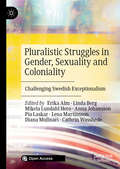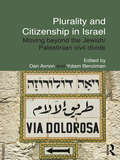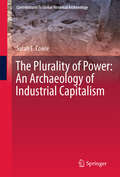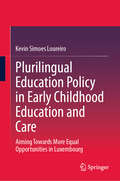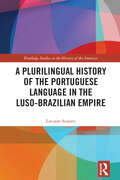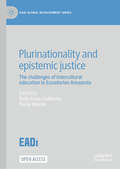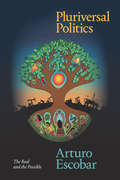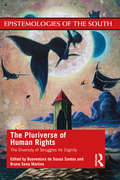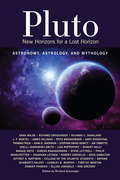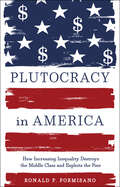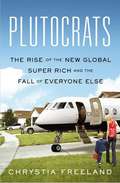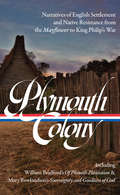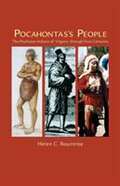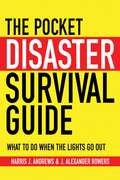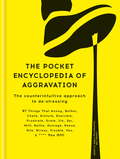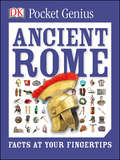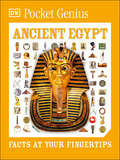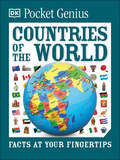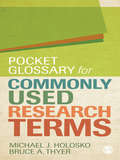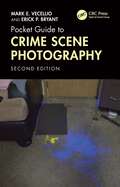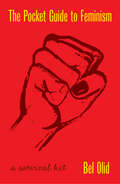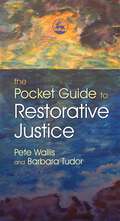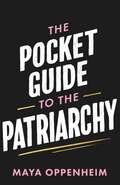- Table View
- List View
Pluralistic Struggles in Gender, Sexuality and Coloniality: Challenging Swedish Exceptionalism
by Linda Berg Diana Mulinari Lena Martinsson Anna Johansson Cathrin Wasshede Erika Alm Mikela Lundahl Hero Pia LaskarThis open access book seeks to understand how politics is being made in a pluralistic sense, and explores how these political struggles are challenging and transforming gender, sexuality, and colonial norms. As researchers located in Sweden, a nation often cited as one of the most gender-equal and LGBTQ-tolerant nations, the contributions investigate political processes, decolonial struggles, and events beyond, nearby, and in between organizations, states, and national territories. The collection represents a variety of disciplines, and different theoretical conceptualizations of politics, feminist theory, and postcolonial and queer studies. Students and researchers with an interest of queer studies, gender studies, critical whiteness studies, and civil society studies will find this book an invaluable resource.
Plurality and Citizenship in Israel: Moving Beyond the Jewish/Palestinian Civil Divide (Routledge Studies in Middle Eastern Politics)
by Dan Avnon Yotam BenzimanIsrael's political process is too often framed in terms of a dichotomy between Jewish and Arab/Palestinian citizens of the state, a framing which perpetuates political inequality and consequent injustices. This book focuses on the conflict within Israel and the role played by modern states in either mitigating majority-minority conflict or exacerbating it.This comparative study concentrates on theoretical models and historical, legal or political patterns of development. With an emphasis on alternative approaches to alleviating civic and political inequality in a divided society such as Israel's, the book examines plurality and political pluralism as keys to enhancing Israel's democratic character. The dozen original essays address many of the basic points of contention between Jews and Arab/Palestinians within the Israeli civic body: unequal access to citizenship; unequal access to land; discrimination in access to public services; insufficient defence of minority rights in Israel's legal system; unequal obligations; unequal economic opportunities. The essays raise a matter of principle that goes beyond the Israeli case: formal legal measures are relatively worthless if they are not preceded by political processes that are oriented to changing conceptions and perceptions of reality. Relevant to those who wish to understand the unobserved dynamics within a divided society, this book will be of particular interest to students of comparative politics, conflict resolution and Middle East studies.
The Plurality of Power
by Sarah CowieHow do people experience power within capitalist societies? Research presented here explicitly addresses the notion of pluralistic power, which encompasses both productive and oppressive forms of power and acknowledges that nuanced and multifaceted power relations can exist in combination with binary dynamics such as domination and resistance. This volume addresses growing interests in linking past and present power relationships engendered by capitalism and in conducting historical archaeology as anthropology. The Plurality of Power: Industrial Capitalism and the Nineteenth-Century Company Town of Fayette, Michigan, explores the subtle distribution of power within American industrial capitalism through a case study of a company town. Issues surrounding power and agency are explored in regard to three heuristic categories of power. In the first category, the company imposed a system of structural, class-based power that is most visible in hierarchical differences in pay and housing, as well as consumer behavior. A second category addresses disciplinary activities surrounding health and the human body, as observed in the built environment, medical artifacts, disposal patterns of industrial waste, incidence of intestinal parasites, and unequal access to healthcare. The third ensemble of power relations is heterarcical and entwined with non-economic capital (social, symbolic, and cultural). Individuals and groups drew upon different forms of capital to bolster social status and express identity both within and apart from the corporate hierarchy. The goal in combining these diverse ideas is to explore the plurality of power relationships in past industrial contexts and to assert their relevance in the anthropology of capitalism.
Plurilingual Education Policy in Early Childhood Education and Care: Aiming Towards More Equal Opportunities in Luxembourg
by Kevin Simoes LoureiroThis book explores the implementation of educational policies aimed at addressing educational inequalities and specifically focuses on Luxembourg’s pioneering plurilingual education policy in non-formal early childhood education and care. It emphasizes the significance of developing plurilingual policies that accommodate diverse linguistic and organizational contexts, ensuring more effective implementation and equitable educational opportunities for all children. Through an in-depth analysis, this book provides insights into various aspects of policy implementation. It delves into the drivers and goals of the plurilingual policy, the measures taken to implement it, the challenges encountered, and the success factors identified at the policy level. Additionally, it examines the attitudes, intentions and obstacles faced by those involved at the practice level. Drawing on a range of theoretical frameworks and empirical studies, the book presents multiple perspectives on the subject. By employing a mixed-methods design, including policy document analysis of the plurilingual education program, expert interviews with policy-level stakeholders and a cross-sectional survey of early childhood practitioners in the non-formal education sector, this work offers a multifaceted approach. The book not only enhances the understanding of policy implementation processes, but also sheds light on the practical implications and potential for reducing educational inequalities in multilingual educational settings. The findings and discussions in this book are, thus, pertinent not only to Luxembourg, but also offer policy- and practice-related implications for similar educational contexts globally.
A Plurilingual History of the Portuguese Language in the Luso-Brazilian Empire
by Luciane ScaratoThis book investigates the diverse ways in which the Portuguese language expanded in Brazil, despite the multilingual landscape that predominated before and after the arrival of the Europeans and the African diaspora. Challenging the assumption that the prevalence of Portuguese was a natural consequence and foregone conclusion of colonisation, the book argues that the language’s expansion was as much a result of state intervention as of individual agency. The growth of the Portuguese language was a tumultuous process that mirrored the power relations and conflicts between Amerindian, European, African, and mestizo actors who shaped, standardised, and promoted the language within and beyond state institutions. Knowing Portuguese became an identification sign of being Brazilian. However, a significant number of languages disappeared along the way, and the book highlights that virtual language homogeneity does not imply social equality. Portuguese’s variants place speakers on different social levels that justify domination and inequality. This research tells the history of a victorious language and other languages that left their mark on Brazilian Portuguese. A Plurilingual History of the Portuguese Language in the Luso-Brazilian Empire is a useful resource for scholars interested in the history and standardisation of languages, Portuguese and Brazilian history, and the impacts of colonisation.
Plurinationality and epistemic justice: The challenges of intercultural education in Ecuadorian Amazonia (EADI Global Development Series)
by Ruth Arias-Gutiérrez Paola MinoiaThis book examines interculturality in education in Ecuador at the crossroads between an educational model inherited from the colonial past, which still represents white and mestizo hegemony, and a vision of an alternative form of decolonizing education that contributes to the development of an intercultural and plurinational state, as promised in the Ecuadorian Constitution. Championing indigenous voices and discussing the role of education in the fight against poverty and in the recovery of cultural and ecological diversity, the authors propose that quality education for all, a target of the Sustainable Development Goals, should move out of the commonly defined models of technological modernization and cultural globalization that disvalue knowledge from other cultures. Through their analysis of practical experimentations of indigenous and intercultural education in Amazonian schools and universities, they conclude that enhanced preservation of indigenous languages, cultures and ecological knowledge prove fundamental prerequisites for biological conservation and strengthening societies’ resilience to climate change threats.
Pluriversal Politics: The Real and the Possible (Latin America in Translation)
by Arturo EscobarIn Pluriversal Politics Arturo Escobar engages with the politics of the possible and how established notions of what is real and attainable preclude the emergence of radically alternative visions of the future. Reflecting on the experience, philosophy, and practice of indigenous and Afro-descendant activist-intellectuals and on current Latin American theoretical-political debates, Escobar chronicles the social movements mobilizing to defend their territories from large-scale extractive operations in the region. He shows how these movements engage in an ontological politics aimed at bringing about the pluriverse—a world consisting of many worlds, each with its own ontological and epistemic grounding. Such a politics, Escobar contends, is key to crafting myriad world-making stories telling of different possible futures that could bring about the profound social transformations that are needed to address planetary crises. Both a call to action and a theoretical provocation, Pluriversal Politics finds Escobar at his critically incisive best.
The Pluriverse of Human Rights: The Diversity of Struggles for Dignity (Epistemologies of the South)
by Boaventura de Sousa Santos and Bruno Sena MartinsThe impasse currently affecting human rights as a language used to express struggles for dignity is, to a large extent, a reflection of the epistemological and political exhaustion which blights the global North. Since the global hegemony of human rights as a language for human dignity is nowadays incontrovertible, the question of whether it can be used in a counter-hegemonic sense remains open. Inspired by struggles from all corners of the world that reveal the potential but, above all, the limitations of human rights, this book offers a highly conditional response. The prevailing notion of human rights today, as the hegemonic language of human dignity, can only be resignified on the basis of answers to simple questions: why does so much unjust human suffering exist that is not considered a violation of human rights? Do other languages of human dignity exist in the world? Are these other languages compatible with the language of human rights? Obviously, we can only find satisfactory answers to these questions if we are able to envisage a radical transformation of what is nowadays known as human rights. Herein lies the challenge posed by the Epistemologies of the South: reconciling human rights with the different languages and forms of knowledge born out of struggles for human dignity.
Pluto
by Rob Brezsny Robert Kelly Dana Wilde Richard C. Hoagland Richard GrossingerEncompassing astronomy, mythology, psychology, and astrology, Pluto offers a wealth of knowledge about our most famous dwarf planet. First observed in 1930 and once defined as the ninth and final planet in our solar system, Pluto and its discovery and reclassification throw a unique light on how we generate meaning in science and culture. This anthology, timed to appear in concordance with NASA's New Horizons's approach to Pluto in July 2015, shows that while the astronomical Pluto may be little more than an ordinary escaped moon or tiny Kuiper Belt object, it is a powerful hyperobject, for its mythological and cultural effigies on Earth incubate deep unconscious seeds of the human psyche. Certain astronomical features pertain to Pluto in terms of its distance from the Sun, coldness, and barrenness. These also inform its mythology and astrology as befitting a planet named after the God of the Underworld. Among the issues central to this collection are the meanings of darkness, loss, grief, inner transformation, rebirth, reincarnation, and karmic revelation, all of which are associated with the astrology of Pluto. Pluto also embodies the meaning of true wealth as being nonmaterial essence instead of property, conventional accolades, ego identity, achievement. It is the marker of negative capability. Table of ContentsDana Wilde: Pluto on the Borderlands; Richard Grossinger: Pluto and The Kuiper Belt; Richard C. Hoagland: New Horizon ... for a Lost Horizon; J. F. Martel: Pluto and the Death of God; James Hillman: Hades; Fritz Bruhubner: The Mythology and Astrology of Pluto; Thomas Frick: Old Horizons; John D. Shershin: The Inquisition of Pluto; Stephan David Hewitt: Pluto and the Restoration of Soul; Jim Tibbetts: Our Lady of Pluto, the Planet of Purification; Shelli Jankowski-Smith: Love Song for Pluto; Robert Kelly: Pluto; Dinesh Raghavendra: Falling in Love with a Plutonian; Steve Luttrell: Dostoevsky's PlutoPhilip Wohlstetter: Ten Things I'd Like to Find on Pluto; Jonathan Lethem: Ten Things I'd Like to Find on Pluto; Robert Sardello: Ten Things I'd Like to Find on Pluto; Ross Hamilton: Ten Things I'd Like to Find on Pluto; Robert Phoenix: My Father Pluto; Ellias Lonsdale: Pluto is the Reason We Have a Chance; Rob Brezsny: Pluto: Planet of WealthFrom the Trade Paperback edition.
Plutocracy in America: How Increasing Inequality Destroys the Middle Class and Exploits the Poor
by Ronald P. FormisanoA hard-hitting analysis of how the disparity between wealth and poverty undermines the common good.The growing gap between the most affluent Americans and the rest of society is changing the country into one defined—more than almost any other developed nation—by exceptional inequality of income, wealth, and opportunity. This book reveals that an infrastructure of inequality, both open and hidden, obstructs the great majority in pursuing happiness, living healthy lives, and exercising basic rights. A government dominated by finance, corporate interests, and the wealthy has undermined democracy, stunted social mobility, and changed the character of the nation. In this tough-minded dissection of the gulf between the super-rich and the working and middle classes, Ronald P. Formisano explores how the dramatic rise of income inequality over the past four decades has transformed America from a land of democratic promise into one of diminished opportunity. Since the 1970s, government policies have contributed to the flow of wealth to the top income strata. The United States now is more a plutocracy than a democracy. Formisano surveys the widening circle of inequality’s effects, the exploitation of the poor and the middle class, and the new ways that predators take money out of Americans’ pockets while passive federal and state governments stand by. This data-driven book offers insight into the fallacy of widespread opportunity, the fate of the middle class, and the mechanisms that perpetuate income disparity.
Plutocrats: The Rise of the New Global Super-Rich and the Fall of Everyone Else
by Chrystia FreelandA Financial Times Best Book of the YearShortlisted for the Lionel Gelber PrizeThere has always been some gap between rich and poor in this country, but recently what it means to be rich has changed dramatically. Forget the 1 percent—Plutocrats proves that it is the wealthiest 0.1 percent who are outpacing the rest of us at breakneck speed. Most of these new fortunes are not inherited, amassed instead by perceptive businesspeople who see themselves as deserving victors in a cutthroat international competition. With empathy and intelligence, Plutocrats reveals the consequences of concentrating the world’s wealth into fewer and fewer hands. Propelled by fascinating original interviews with the plutocrats themselves, Plutocrats is a tour de force of social and economic history, the definitive examination of inequality in our time.
Plymouth Colony: Narratives of English Settlement and Native Resistance from the Mayflower to King Philip's War (LOA #337)
Four centuries after the Mayflower's arrival, a landmark collection of firsthand accounts charting the history of the English newcomers and their fateful encounters with the region's Native peoplesFor centuries the story of the Pilgrims and the Mayflower has been told and retold--the landing at Plymouth Rock and the first Thanksgiving, and the decades that followed, as the colonists struggled to build an enduring and righteous community in the New World wilderness. But the place where the Plymouth colonists settled was no wilderness: it was Patuxet, in the ancestral homeland of the Wampanoag people, a long-inhabited region of fruitful and sustainable agriculture and well-traveled trade routes, a civilization with deep historical memories and cultural traditions. And while many Americans have sought comfort in the reassuring story of peaceful cross-cultural relations embodied in the myth of the first Thanksgiving, far fewer are aware of the complex history of diplomacy, exchange, and conflict between the Plymouth colonists and Native peoples. Now, Plymouth Colony brings together for the first time fascinating first-hand narratives written by English settlers--Mourt's Relation, the classic account of the colony's first year; Governor William Bradford's masterful Of Plimouth Plantation; Edward Winslow's Good News from New England; the heterodox Thomas Morton's irreverent challenge to Puritanism, New English Canaan; and Mary Rowlandson's landmark "captivity narrative" The Sovereignty and Goodness of God--with a selection of carefully chosen documents (deeds, patents, letters, speeches) that illuminate the intricacies of Anglo-Native encounters, the complex role of Christian Indians, and the legacy of Massasoit, Weetamoo, Metacom ("King Philip"), and other Wampanoag leaders who faced the ongoing incursion into their lands of settlers from across the sea. The interactions of Plymouth Colony and the Wampanoag culminated in the horrors of King Philip's War, a conflict that may have killed seven percent of the total population, Anglo and Native, of New England. While the war led to the end of Plymouth's existence as a separate colony in 1692, it did not extinguish the Wampanoag people, who still live in their ancestral homeland in the twenty-first century.
Po' Monkey's: Portrait of a Juke Joint
by Will JacksOutside of Merigold, Mississippi, off an unmarked dirt road, stands Po’ Monkey’s, perhaps the most famous house in Mississippi and the last rural juke joint in the state, now closed to the public. Before the death of the lounge’s owner, Willie Seaberry, in 2016, it was a mandatory stop on the constant blues pilgrimage that flows through the Delta. Seaberry ran Po’ Monkey’s Lounge for more than fifty years, opening his juke joint in the 1960s. A hand-built tenant home located on the plantation where Seaberry worked, Po’ Monkey’s was a place to listen to music and drink beer—a place to relax where everyone was welcomed by Seaberry’s infectious charm. In Po’ Monkey’s: Portrait of a Juke Joint, photographer Will Jacks captures the juke joint he spent a decade patronizing. The more than seventy black-and-white photographs featured in this volume reflect ten years of weekly visits to the lounge as a regular—a journal of Jacks’s encounters with other customers, tourists, and Willie Seaberry himself. An essay by award-winning writer Boyce Upholt on the cultural significance of the lounge accompanies the images. This volume explores the difficulties of preservation, historical context, community relations, and cultural tourism. Now that Seaberry is gone, the uncertainty of the future of his juke joint highlights the need for a historical record.
Po’Boy (Louisiana True)
by Burke BischoffPo’Boy tells the story of how a humble sandwich became a symbol of New Orleans culture, history, and cuisine. Invented to help feed a crowd of out-of-work individuals in New Orleans’s streetcar industry, the po’boy is a submarine-like sandwich served on French bread, with common fillings that include fried seafood, roast beef and gravy (“debris”), and hot sausage. Rich with historical detail, Po’Boy welcomes readers into the world of the city’s most iconic sandwich.
Pocahontas's People: The Powhatan Indians of Virginia through Four Centuries
by Helen C. RountreeThe author explores the diversity always found among Powhatan people, and those people’s relationships with the English, the government of the fledgling United States, the Union and the Confederacy, the U.S. Census Bureau, white supremacists, the U.S. Selective Service, and the civil rights movement.
The Pocket Disaster Survival Guide: What to Do When the Lights Go Out
by Harris J. Andrews J. Alexander BowersWhether it’s a hurricane bearing down on a home near the coast or a power line downed in a snowstorm near a car, are you prepared for these situations? This slim handbook will provide you with all the information you need to ensure that you, your family, and your pets can weather any emergency crisis. Learn the necessity of backing up important documents, how to safely store food and water for more than a day, and how to communicate with your family and emergency personnel should a disaster strike.
The Pocket Encyclopedia of Aggravation: The Counterintuitive Approach to De-stressing
by Laura LeeAaarghgghhh!!@#%&*!!! Every time your mobile phone rings, it's an automated PPI call... You've forgotten one of your million different internet passwords... Once again, you're stuck in the slowest lane at the supermarket...This book investigates 97 day-ruining events, slap-in-the-face moments and everyday aggravations, and explains why these things irritate us quite so much. Let's face it, the world is becoming an increasingly annoying place to live - and THE POCKET ENCYCLOPEDIA OF AGGRAVATION has the evidence to prove it. It has been scientifically proven that when we understand the science behind our daily grievances, our problems become less frustrating and easier to manage. This fact-filled book will help reduce the stress of your daily grind. Designed with enlightening diagrams and witty drawings, THE POCKET ENCYCLOPEDIA OF AGGRAVATION finally answers the question, why is that so f*cking annoying?
Pocket Genius: Facts at Your Fingertips (Pocket Genius)
by DKPocket Genius: Ancient Rome is filled with bite-sized chunks of information that make learning about the Roman Empire even more fun. Find out what Romans ate at their banquets and what bloody spectacles they watched at the arena. Read about cruel emperors and brave gladiators and how Romans built their roads, aqueducts, palaces, and temples, and use the catalog entries to find out fast facts about everything to do with the Romans — from their gods and goddesses to their toys, games, and musical instruments. Packed with amazing encyclopedic stats, engaging photographs and facts, Pocket Genius: Ancient Rome explores the empire that dominated Europe and the Middle East for more than 500 years. Full of instant information, the Pocket Genius series features a fresh and striking design that is sure to appeal to the middle grade audience. Supports the Common Core State Standards.
Pocket Genius: Facts at Your Fingertips (Pocket Genius)
by DKUnravel the mysteries behind one of the most powerful and influential civilizations in history with this handy guide to ancient Egypt.Set off on a historical adventure and view the pyramids of Giza up close, take a walk along the river Nile, decode tricky hieroglyphs, discover the resting place of Tutankhamun, admire ancient wooden dolls enshrined in tombs, and pay respect to the pharaohs. Tracing major developments between 2700 and 30 BCE, Pocket Genius: Ancient Egypt gives you a glimpse inside the gigantic temples of ancient Egypt, of the regalia of the royalty, of the citizens&’ remarkable daily life, and much more. Packed with maps, rich illustrations, and stunning photographs, this children's book chronicles everything from medicines and toys to the houses of ancient Egypt. Pocket Genius: Ancient Egypt comes with bite-sized chunks of text and stunning images that will encourage and inform even the most reluctant readers.
Pocket Genius Countries of the World (Pocket Genius)
by DKPacked with striking photography, this compact Countries of the World guide explores over 200 countries and territories from around the world.Explore the planet and journey across the world to discover what makes it special in this fact-filled Pocket Eyewitness book for children aged 9-12.This country guide is divided into continental chapters, featuring each nation's geography, climate, and economics, supplemented by stats and data. Children will learn the national flags, official names, capital cities, populations, total area, population density, languages, literacy rate, type of government, and currency, all meticulously researched from the latest sources.This condensed children&’s guide on Countries of the World offers: - A pocket-sized but detailed guide, fitting all the important information into one small package.- Up to 200 country profiles, each featuring a map, flag and keynote statistics.- Easy-to-navigate chapters presented in geographical order, making it easy to explore the world.Which is the biggest country in the world? Which one has the most people? Which one has three capital cities? Children can find the answers to these questions and more in the pages of this illustrated reference guide to all the countries of the world.Suitable for all children interested in geography, this guide presents lots of useful information and facts about the world we live in. Each country entry has a full-color map showing terrain, major places, and geographical features. There is also a fascinating 'insight' fact for each country revealing interesting details that make places so unique.
Pocket Glossary for Commonly Used Research Terms
by Michael Holosko Bruce A. ThyerThis book contains over 1500 research and statistical terms, written in jargon-free, easy-to-understand terminology to help students understand difficult concepts in their research courses. This pocket guide is in an ideal supplement to the many discipline-specific texts on research methods and statistics.
Pocket Guide to Crime Scene Photography
by null Mark E. Vecellio null Erick P. BryantThere are more than 800,000 sworn law enforcement officers employed within the United States, many of whom are regularly tasked with photographing crime scenes or evidence associated with criminal investigations. Despite this fact, law enforcement personnel—including detectives and crime scene investigators—frequently receive little to no formal training in the art and science of photography, let alone for capturing photographic evidence for forensic casework and future legal proceedings. Unlike other resources on the topic that often contain overly complicated or rife with unnecessary or confusing technical jargon—this edition of Pocket Guide to Crime Scene Photography follows in the tradition of the first. The book is wholly updated, based on best practices and advances in camera technology to provide a practical, streamlined approach guide to the photographic documentation of crime scenes and physical evidence. The coverage includes extensive illustrations with two completely new chapters. The first focuses on specialized instructions for photographing shooting incident scenes, bloodstains, and evidence, made visible through infrared light; the is second dedicated to offering advice for photographing crime scenes and evidence with mobile device cameras.Chapters distill the technical jargon and complex processes of photographing crime scenes and evidence into straightforward step-by-step descriptions. Pocket Guide to Crime Scene Photography, Second Edition has been designed in a smaller, handy trim size as a convenient, portable tool to help busy professionals. Its techniques include practical guidelines that can be immediately implemented by law enforcement personnel to maximize their time and improve their skills.Features: Provides an up-to-date, portable reference ideal for use in the field; includes full-color photographs throughout to illustrate key concepts Details how to document various types of evidence, and crime scenes, using both standard and specialized techniques Outlines visualization and photography of evidence—illuminated with alternative light sources—including visible wavelengths, UV, and infrared Presents guidance for personnel who might only be able to use cell phone cameras for photographing evidence and scenes Written by two experienced professionals who know the investigative and courtroom requirements for quality admissible photos.
The Pocket Guide to Feminism: A Survival Kit
by Bel OlidA woman’s life is different. This is clear when a stranger’s catcall makes her feel targeted in the street. When politicians make off-the-cuff sexist remarks. When media commentators wade in with their condemnation of free, unrestricted abortion. When a father is praised to the skies for attending parents’ evening while the mother’s attendance is taken for granted. When they fire her because she’s pregnant. When they dismiss her medical symptoms as anxiety. To counter sexism today, we need to learn the art of self-defence. Today, feminism is more alive and more necessary than ever because discrimination against women has become more subtle and difficult to detect, yet it retains its paralysing power. With combative energy and acerbic wit, Bel Olid explains the key concepts of the current feminist struggle in a smart, radical and often counterintuitive way.
The Pocket Guide to Restorative Justice
by Pete Wallis Barbara Tudor Chris SlaneThis pocket-sized guide can be taken conveniently to meetings, interviews and visits, to be used as a quick reference point for information about the practical application of restorative justice. The book covers every stage of the process, from how a facilitator should prepare for taking on a new case, through initial contacts with victim and offender and facilitating meetings, to recording and evaluating a case. While acknowledging throughout the different possible ways of proceeding, the authors provide example prompts for steps such as writing to a victim for the first time, talking to the victim and offender ahead of their meeting, and initiating meetings. They use jargon-free language and provide helpful task checklists for speed and ease of reference. This is an invaluable companion for youth offending team workers, probation officers, prison staff, police, referral order volunteers, mediators and any professional needing to know about restorative justice.
The Pocket Guide to the Patriarchy
by Maya Oppenheim'This is a vital book. Hand this out in schools, in the workplace, everywhere. It's also beautifully written.' Olivia Colman'Brilliant. Patriarchy 101' Amnesty UK'Immersive and accessible' Dazed The essential guide for women everywhere, The Pocket Guide to the Patriarchy is full to the brim with unbelievable stats, shocking figures and emboldening knowledge to understand and fight the patriarchal systems holding all of us back.Across the world, women are still denied opportunities and rights. The home remains the most dangerous place for women to be worldwide; with the majority of homicide victims who are women being killed by partners or relatives. In some countries, women who get abortions after they are raped face jail time. Less than 20 per cent of landholders in the world are women. Despite all these truths, many would prefer to blame women. For not demanding a seat at the table. For walking home alone at night. For not working hard enough to overcome the odds that are stacked against them. In her first fact-filled, inclusive and energising book, Maya Oppenheim supplies you with the unforgettable realities, real-world anecdotes and tales of resistance to help you combat denial and continued injustice as the far-right grows and women's rights come under attack. If yet another rebuttal of patriarchy leaves you lost for words, this book can be pulled out of your pocket. Utilising her breadth of experience as Women's Correspondent at The Independent - and as the only women's correspondent at a UK news outlet - Maya leaves no stone left unturned and sparks new conversations on:Women's HealthSexual ViolenceCriminal Justice SystemSex WorkPolicingFar RightAbortion RightsAnd much more across 22 chapters.Combining poignant stories with startling evidence, The Pocket Guide to the Patriarchy is a blazing examination of the systems rigged against us and offers a way forward that could prompt sustainable reform and build a better world for us all.'Well-written, concise and necessary' Sarah Solemani'Enormously useful' Selma James, feminist thinker, campaigner and author
